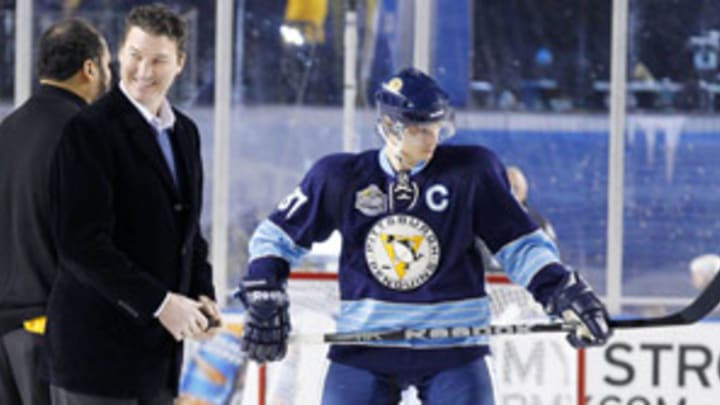Time to retire the Winter Classic


Sorry, but the expiration date on the Winter Classic has come and gone.
Time to retire the outdoor hockey game.
It was great in Buffalo. It was great at Wrigley Field. And since I'm a shameless Boston honk, of course I will tell you that one of the best days in the significant history of Fenway Park was January 1, 2010, when the Boston Bruins beat the Philadelphia Flyers, 2-1, in overtime inside the ballpark made famous by Babe Ruth, Ted Williams and Carl Yastrzemski. I won't soon forget watching a full period of hockey alongside Bobby Orr upstairs in box L-1 behind home plate. Seeing players skate ferociously in cold temperatures under clear skies, Orr talked about how much it reminded him of his youth.
"This is hockey,'' Orr said. "We'd go outdoors in the morning and skate in Georgian Bay or on the Sequin River. All of our skating was outdoors.''
It just wasn't the same last Saturday night as I watched the Penguins and Capitals slushing around on soft, watery ice at night in the middle of Heinz Field.
The Caps beat the Penguins, 3-1, but this was not what the league had in mind. A crowd of 68,111 watched, but they didn't get the atmosphere that made this game so compelling in Buffalo, Chicago and Boston (and let's not forget the Heritage Classic -- hockey's equal of the Ice Bowl, played between the Oilers and Canadiens in sub-zero Edmonton in 2003).
This time, the weather simply did not cooperate. You can usually expect frigid temperatures in Pittsburgh in January, but it was in the 50s late in the week and the 1 p.m. starting time had to be switched to 8 p.m. because of soft ice.
It was playable, but barely. Watching on television, you could see puddling and water splashing in the trail of the puck sliding across the ice. One side of the surface was worse than the other, so the teams changed ends halfway through the third period.
"It was the same conditions for both teams,'' said NHL commissioner Gary Bettman. "In every stoppage, we were in communication with both teams. And while not perfect, the puck was moving pretty well out there.''
Warm weather is nobody's fault. But there were other things about the Pittsburgh Classic which gave hints that this event might have outlived its usefulness.
Let's start with the host city. OK, professional hockey was born in Pittsburgh 100 years ago, but it's simply not a metropolis we associate with hockey. Buffalo is not an original six town, but there's no disputing its qualification as a winter sports mecca. Chicago and Boston are part of NHL genesis. Nuff said.
The venue is another problem. Fenway and Wrigley are obvious palaces of worship. For any sport. Buffalo's Ralph Wilson Stadium worked because it's in Buffalo and got the requisite snow flurries to made for spectacular television. Heinz Field, on the other hand, is a new facility singularly associated with football and the Steelers. It's not old-timey like Fenway or Wrigley. It's simply a football field. Nothing more.
If it's cold enough, I would be OK with any outdoor game in Detroit, Montreal or Toronto. Yankee Stadium might even work. But Heinz Field? Sorry. Steelers only.
The Winter Classic will always be a gamble because winter weather is so unpredictable. Sightlines are going to be brutal because reconfigured ballparks don't offer a lot of primo seats for hockey. If the event is going to work it's got to be really good television and Pittsburgh didn't have the Currier & Ives snowfall, mittened fans, or players spewing hot air into the cold night.
If you freeze it, they will come. That's been the theme in Buffalo, Chicago, Boston, and Pittsburgh. But it's a tough sell in a modern football facility with raindrops falling in 50 degree temperatures.
Last year I believed that hockey was taking over New Year's Day the way baseball owns Fourth of July and football has appropriated Thanksgiving. Now I'm not so sure. I tried watching the Winter Classic Saturday night and it didn't work. The snow globe effect was gone.
It was just a bunch of Penguins and Capitals trying to avoid injury as they skated on ice that was unacceptable for a weeknight over-40 league.
"In the third period, weather became a problem,'' Washington superstar Alex Ovechkin admitted after the victory.
He was being polite. It was more than a problem. The show went on because the show must go on for television, but professional hockey was not meant to be playing in warm weather during a rainstorm.
Outdoors is good. Cold is good. Snow flurries make it even better.
But rain just doesn't work and television won't wait.
Time for the NHL to come back inside to play.
